Asp.net (2) 비즈니스 처리 인터페이스 프로젝트(Web Api)
소개
Api비즈니스 로직 제공자로서 프로젝트의 핵심 로직을 전달하므로 상대적으로 로직 복잡도가 높습니다. 이러한 전제하에 코드 작성을 단순화하는 방법, 작성 스타일과 논리 사양을 표준화하고 통일하는 방법, 코드의 유지 관리성과 확장성을 향상시키는 방법을 설명합니다. 응집력은 높고 결합도는 낮은 프로젝트를 구축하는 것이 중요해졌습니다.
예제는 기업 수준의 프로젝트입니다. 프레임워크는 아래와 같습니다
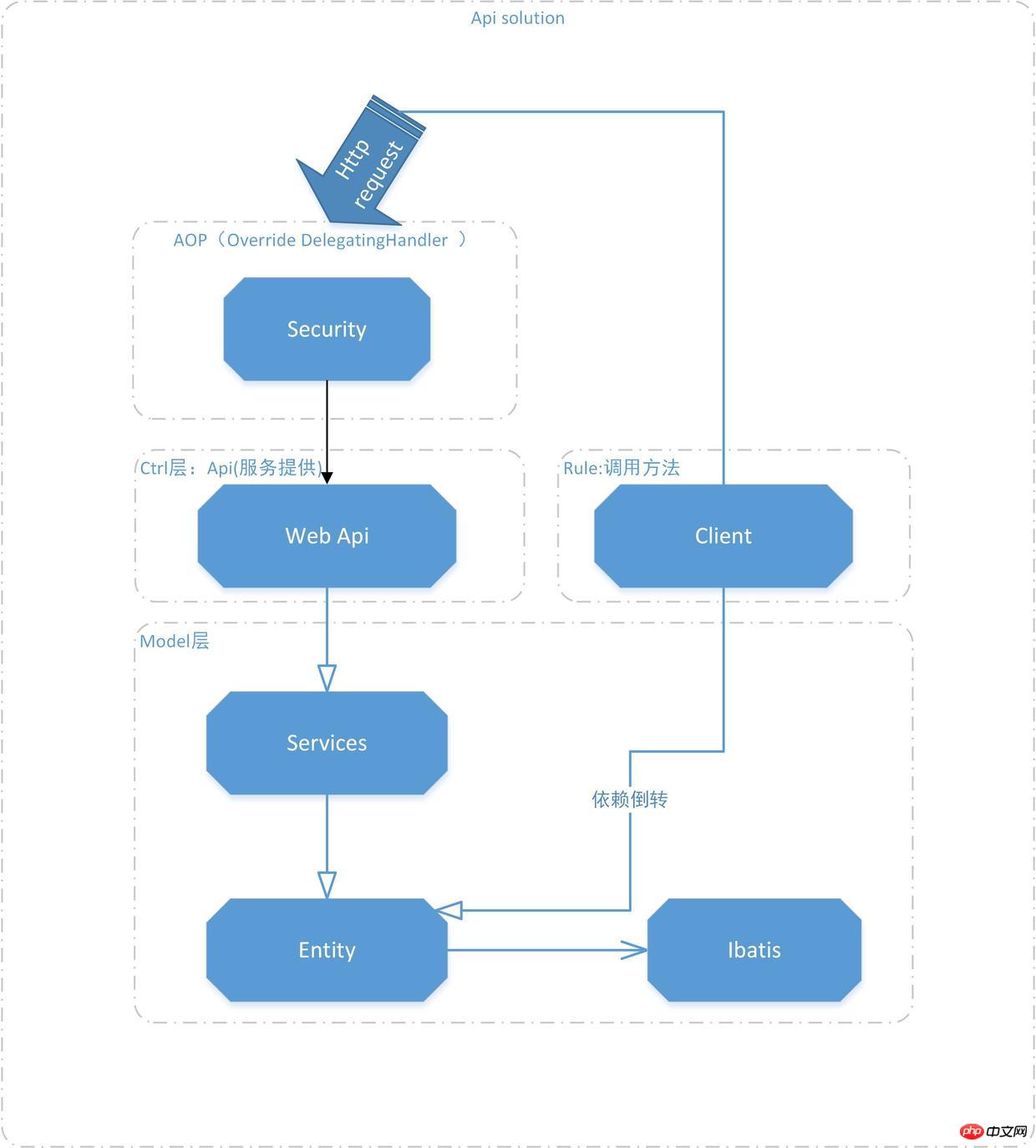
api layer.jpg
보안: Http 요청(DelegatingHan 재정의dler)이 다시 작성되고 요청 측면에서 적법성이 판단되며 서명 요구 사항이 사전 처리됩니다.
클라이언트: 호출 측에서 사용하는 통합 인터페이스 호출 방법을 정의하여 인터페이스 사용을 단순화하고 통합합니다.
Ctrl 레이어: 서비스를 직접 제공하는 역할로 서버에서 RestFul 스타일과 유사한 인터페이스를 직접 제공합니다(완전한 도메인 모델드라이버 , 실제 상황은 항상 불만족스럽고 도메인 추상화 기능이 충분하지 않음) 요청 데이터를 얻고 필요에 따라 FilterFilter를 호출하고 추가 판단을 한 다음
Model. 레이어: 비즈니스 모델 레이어로서 비즈니스 로직의 실제 작동을 제공합니다. 통합 엔터티 모델을 사용하고 데이터 작업을 위해 Ibatis에 연결합니다. 구체적인 코드 구조는 다음과 같습니다.
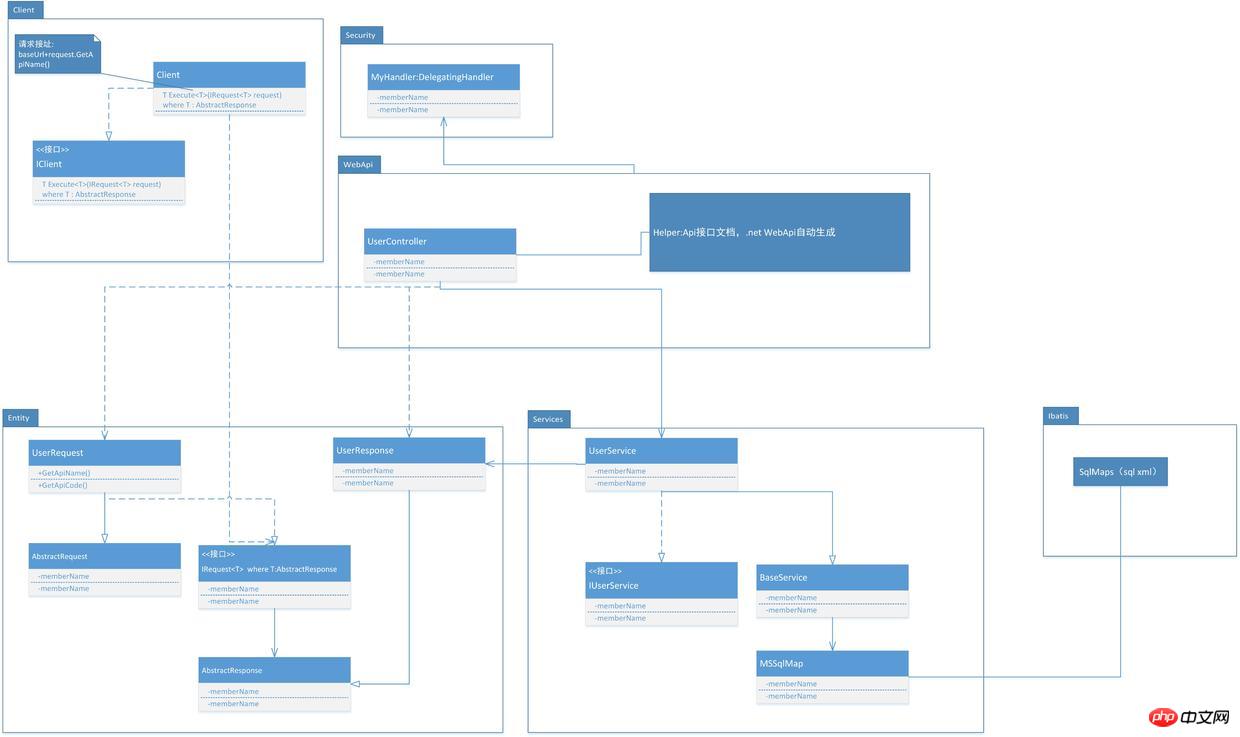
Api-UML.jpg
자세한 코드 소개는 다음과 같습니다. 각 모듈 및 코드 예시:
엔티티 라이브러리 프로젝트 코드 예시
프로젝트 구조는
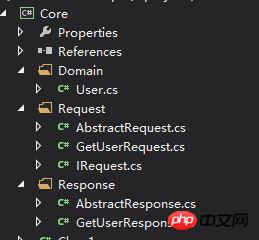
entity입니다. jpg
Do
main 모듈을 엔터티 모델로 간단한 코드는 다음과 같습니다. 요청 구조 모델인 public class User
{
public int Id { get; set; }
public string NickName { get; set; }
public string Avatar { get; set; }
}
public abstract class AbstractRequest
{
public bool ValidateParameters()
{
//公用方法示例,验证参数合法性
}
}
public interface IRequest<T> where T:AbstractResponse
{
//获取接口名称
string GetApiName();
//获取接口编码
string GetApiCode();
}
//获取User信息的请求结构定义
public class GetUserRequest:AbstractRequest,IRequest<GetUserResponse>
{
public int Id { get; set; }
public string GetApiName()
{
return "User.GetUserDetail";
}
public string GetApiCode()
{
return "User001";
}
}응답 모듈은 요청의 반환 유형으로 소비자가 일관성 반환 코드를 판단하고 처리할 수 있도록 통합된 반환 구조를 정의합니다.
public abstract class AbstractResponse
{
//返回码
public int Code { get; set; }
//报错信息
public string Message { get; set; }
}
public class GetUserResponse:AbstractResponse
{
public User User { get; set; }
}서비스 프로젝트 코드 예시
프로젝트 구조는
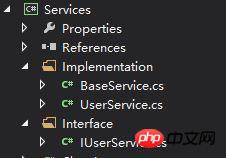
service.jpg
코드 예:
public interface IUserService
{
GetUserResponse GetUser(int id);
}
public class BaseService
{
//protected SqlInstance sqlInstance;
public BaseService()
{
//sqlInstance=new SqlInstance(); //实例化数据库连接
//...
}
//...
}
public class UserService:BaseService,IUserService
{
public GetUserResponse GetUser(int id)
{
//链接数据库获取数据
//...
throw new NotImplementedException();
}
}보안
클래스 라이브러리코드 예클래스 라이브러리는
보안문제만 처리하고 API 요청 항목에 권한 판단을 추가합니다. Http 요청을 다시 작성하는 방법을 사용하십시오. 코드 예시
public class MyHandler : DelegatingHandler
{
protected async override Task<HttpResponseMessage> SendAsync(HttpRequestMessage request, CancellationToken cancellationToken)
{
IEnumerable<string> keyEnumerable;
var t1 = request.Headers.TryGetValues("key", out keyEnumerable);
var key = keyEnumerable.FirstOrDefault();
if (!true)//验证类似于token的权限
{
return await Task.Factory.StartNew<HttpResponseMessage>(
() => new HttpResponseMessage(HttpStatusCode.Forbidden)
{
Content = new StringContent("error message")
});
}
//如果有signature,判断,并加结果标志,没有的话,清除signature相关信息,防止伪造。
//.....
return await base.SendAsync(request, cancellationToken);
}
}추상화된 권한 판단은 webapi 엔드에 직접 호출하여 라우팅
구성 코드에 추가할 수 있습니다. WebApi 프로젝트 예시
webapi는 인터페이스의 실제 정의로서 인터페이스 파일의 실제 규칙을 정의하고 이에 상응하는 인터페이스의
보안 관리및 권한 제어를 수행합니다. . WeChat의 권한 제어를 알아보기 위해 여러 인터페이스가 대략적으로 결정되었습니다.
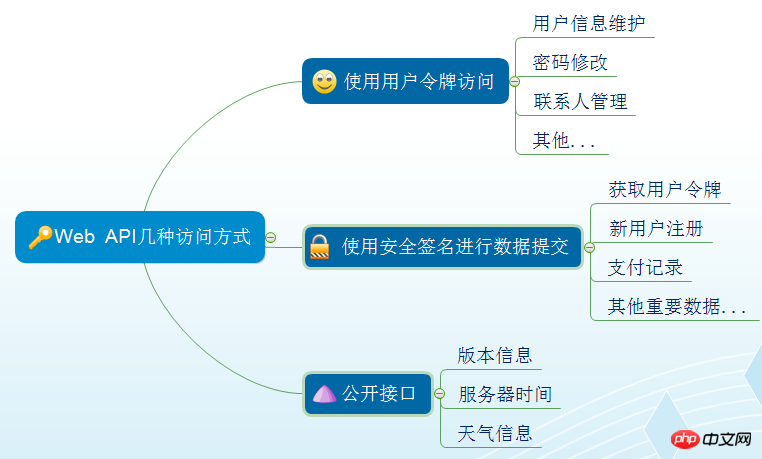
InterfacePermissions.png
코드 예:
public class UserController : ApiController
{
private IUserService userService;
public UserController()
{
userService=new UserService();
}
[Signature]//安全签名过滤器判断
[HttpPost]
public GetUserResponse GetUser(GetUserRequest request)
{
//参数判断,安全性判断等等
var ret = userService.GetUser(request.Id);
return ret;
}
}위는 사용자 정보를 얻기 위한 인터페이스 예시입니다. 인터페이스 입구의 라우팅 구성으로 요청의 적법성을 판단해야 하는 라우팅 구성 코드는 다음과 같습니다. :
public static void Register(HttpConfiguration config)
{
// Web API configuration and services
// Configure Web API to use only bearer token authentication.
config.SuppressDefaultHostAuthentication();
config.Filters.Add(new HostAuthenticationFilter(OAuthDefaults.AuthenticationType));
// Web API routes
config.MapHttpAttributeRoutes();
config.Routes.MapHttpRoute(
name: "DefaultApi",
routeTemplate: "api/{controller}/{action}",
defaults: new { id = RouteParameter.Optional }
);
//添加的代码,添加http请求的入口处理
config.MessageHandlers.Add(new MyHandler());
}클라이언트 클래스 라이브러리 코드 예
클라이언트 클래스 라이브러리는 인터페이스에서 호출되는 공용 메서드를 정의합니다.
1. 일반 인터페이스를 사용하여 요청 클래스와 반환 클래스를 캡슐화하여 호출 코드 작성을 단순화합니다.2. 또한 소비자는 도메인 간 문제를 방지하면서 프록시 클래스를 통해 인터페이스를 호출할 수 있습니다.
3. 소비자 호출은 모두 통일된 클래스 라이브러리를 사용하는 데 동의하므로 로그 처리가 통일되고 반환되는 오류도 일관되게 정의할 수 있습니다.
코드 예시는 다음과 같습니다.
public interface IClient
{
T Execute<T>(IRequest<T> request) where T : AbstractResponse;
}
public class DefaultClient:IClient
{
private readonly string appKey;
private readonly string appSecret;
private readonly string baseUrl = "http://localhost:16469/api/";
private readonly bool isNeedLogFile = false;
private readonly LogFile logFile;
public static readonly string SecureHeaderAppKey = "secure_head_appkey";
public static readonly string SecureHeaderSignature = "secure_head_signature";
public DefaultClient()
{
baseUrl = ConfigurationManager.AppSettings["service_base_url"];
appKey = ConfigurationManager.AppSettings["app_key"];
appSecret = ConfigurationManager.AppSettings["app_secret"];
isNeedLogFile = "1".Equals(ConfigurationManager.AppSettings["client_log_file"]);
logFile = new LogFile("client_log_path");
logFile.SubPath = appKey;
}
public DefaultClient(string serviceBase, string code, string key)
{
baseUrl = serviceBase;
appKey = code;
appSecret = key;
}
public T Execute<T>(IRequest<T> request) where T : AbstractResponse
{
var webRequest = (HttpWebRequest)WebRequest.Create(baseUrl + request.GetApiName());
webRequest.Method = "POST";
string reqJson;
string sign;
using (Stream rs = webRequest.GetRequestStream())
{
reqJson = JsonConvert.SerializeObject(request);
byte[] reqBytes = Encoding.UTF8.GetBytes(reqJson);
rs.Write(reqBytes, 0, reqBytes.Length);
rs.Close();
}
webRequest.ContentType = "application/json";
webRequest.Headers.Add(SecureHeaderAppKey, appKey);
sign = ComputeHash(appKey, appSecret, reqJson);
webRequest.Headers.Add(SecureHeaderSignature, sign);
//记录日志
if (isNeedLogFile)
{
logFile.Log(string.Format("[{0}] 请求内容: {1}", request.GetApiCode(), reqJson));
logFile.Log(string.Format("[{0}] 请求签名: {1}", request.GetApiCode(), sign));
}
try
{
using (var resp = (HttpWebResponse)webRequest.GetResponse())
{
try
{
Stream respStream = resp.GetResponseStream();
if (respStream == null)
{
throw new WebException("GetResponseStream returned null");
}
var streamReader = new StreamReader(respStream);
string respStr = streamReader.ReadToEnd();
//记录日志
if (isNeedLogFile)
{
logFile.Log(string.Format("[{0}] 响应内容: {1}", request.GetApiCode(), respStr));
}
return JsonConvert.DeserializeObject<T>(respStr);
}
catch (Exception e)
{
//记录日志
if (isNeedLogFile)
{
logFile.Log(string.Format("[{0}] 响应错误: {1}", request.GetApiCode(), e.Message));
}
throw new ApplicationException(e.Message, e);
}
}
}
catch (WebException e)
{
var errMsg = new StreamReader(e.Response.GetResponseStream()).ReadToEnd();
//记录日志
if (isNeedLogFile)
{
logFile.Log(string.Format("[{0}] 请求错误: {1}", request.GetApiCode(), errMsg));
}
throw new APIServiceException(errMsg);
}
}
private string ComputeHash(string key, string secret, string body)
{
return
Convert.ToBase64String(
SHA1.Create().ComputeHash(Encoding.Default.GetBytes(string.Concat(key, secret, body.Trim()))));
}
}以上就是Api项目端的各个核心环节的详细介绍。
接下来会对调用端即前端进行简单的介绍。Asp.net(三)Web端展示
위 내용은 Asp.net (2) 비즈니스 처리 인터페이스 프로젝트(Web Api)의 상세 내용입니다. 자세한 내용은 PHP 중국어 웹사이트의 기타 관련 기사를 참조하세요!

핫 AI 도구

Undresser.AI Undress
사실적인 누드 사진을 만들기 위한 AI 기반 앱

AI Clothes Remover
사진에서 옷을 제거하는 온라인 AI 도구입니다.

Undress AI Tool
무료로 이미지를 벗다

Clothoff.io
AI 옷 제거제

Video Face Swap
완전히 무료인 AI 얼굴 교환 도구를 사용하여 모든 비디오의 얼굴을 쉽게 바꾸세요!

인기 기사

뜨거운 도구

메모장++7.3.1
사용하기 쉬운 무료 코드 편집기

SublimeText3 중국어 버전
중국어 버전, 사용하기 매우 쉽습니다.

스튜디오 13.0.1 보내기
강력한 PHP 통합 개발 환경

드림위버 CS6
시각적 웹 개발 도구

SublimeText3 Mac 버전
신 수준의 코드 편집 소프트웨어(SublimeText3)

뜨거운 주제
 7662
7662
 15
15
 1393
1393
 52
52
 1205
1205
 24
24
 91
91
 11
11
 73
73
 19
19
 컴퓨터 마더보드의 내부 인터페이스는 무엇입니까? 컴퓨터 마더보드의 내부 인터페이스에 대한 권장 소개
Mar 12, 2024 pm 04:34 PM
컴퓨터 마더보드의 내부 인터페이스는 무엇입니까? 컴퓨터 마더보드의 내부 인터페이스에 대한 권장 소개
Mar 12, 2024 pm 04:34 PM
컴퓨터를 조립할 때 설치 과정은 간단하지만 배선에 문제가 발생하는 경우가 종종 있습니다. 컴퓨터가 켜지면 F1 오류 "CPUFanError"가 발생하며 이로 인해 CPU 쿨러가 지능적으로 속도를 조정할 수 없게 됩니다. 컴퓨터 마더보드의 CPU_FAN, SYS_FAN, CHA_FAN, CPU_OPT 인터페이스에 대한 상식을 공유해 보겠습니다. 컴퓨터 마더보드의 CPU_FAN, SYS_FAN, CHA_FAN 및 CPU_OPT 인터페이스에 대한 대중적인 과학 1. CPU_FANCPU_FAN은 CPU 라디에이터 전용 인터페이스이며 12V에서 작동합니다.
 Go 언어의 일반적인 프로그래밍 패러다임 및 디자인 패턴
Mar 04, 2024 pm 06:06 PM
Go 언어의 일반적인 프로그래밍 패러다임 및 디자인 패턴
Mar 04, 2024 pm 06:06 PM
현대적이고 효율적인 프로그래밍 언어인 Go 언어에는 개발자가 유지 관리 가능한 고품질 코드를 작성하는 데 도움이 될 수 있는 풍부한 프로그래밍 패러다임과 디자인 패턴이 있습니다. 이 기사에서는 Go 언어의 일반적인 프로그래밍 패러다임과 디자인 패턴을 소개하고 구체적인 코드 예제를 제공합니다. 1. 객체지향 프로그래밍 Go 언어에서는 구조와 메소드를 사용하여 객체지향 프로그래밍을 구현할 수 있습니다. 구조를 정의하고 구조에 대한 바인딩 방법을 통해 데이터 캡슐화 및 동작 바인딩의 객체 지향 기능을 구현할 수 있습니다. 패키지메니
 PHP 인터페이스 소개 및 정의 방법
Mar 23, 2024 am 09:00 AM
PHP 인터페이스 소개 및 정의 방법
Mar 23, 2024 am 09:00 AM
PHP 인터페이스 소개 및 정의 방법 PHP는 웹 개발에 널리 사용되는 오픈 소스 스크립팅 언어입니다. 유연하고 간단하며 강력합니다. PHP에서 인터페이스는 여러 클래스 간의 공통 메서드를 정의하여 다형성을 달성하고 코드를 보다 유연하고 재사용 가능하게 만드는 도구입니다. 이 기사에서는 PHP 인터페이스의 개념과 이를 정의하는 방법을 소개하고 사용법을 보여주는 특정 코드 예제를 제공합니다. 1. PHP 인터페이스 개념 인터페이스는 클래스 애플리케이션을 정의하는 객체 지향 프로그래밍에서 중요한 역할을 합니다.
 NotImplementedError()에 대한 솔루션
Mar 01, 2024 pm 03:10 PM
NotImplementedError()에 대한 솔루션
Mar 01, 2024 pm 03:10 PM
오류의 원인은 Python입니다. Tornado에서 NotImplementedError()가 발생하는 이유는 추상 메서드나 인터페이스가 구현되지 않았기 때문일 수 있습니다. 이러한 메서드나 인터페이스는 상위 클래스에서 선언되지만 하위 클래스에서는 구현되지 않습니다. 서브클래스가 제대로 작동하려면 이러한 메서드나 인터페이스를 구현해야 합니다. 이 문제를 해결하는 방법은 부모 클래스에서 선언한 추상 메서드나 인터페이스를 자식 클래스에 구현하는 것입니다. 다른 클래스에서 상속하기 위해 클래스를 사용하는 경우 이 오류가 표시되면 상위 클래스에 선언된 모든 추상 메서드를 하위 클래스에 구현해야 합니다. 인터페이스를 사용하고 있는데 이 오류가 표시되면 인터페이스를 구현하는 클래스의 인터페이스에 선언된 모든 메서드를 구현해야 합니다. 어느 것이 확실하지 않은 경우
 Java의 디자인 패턴에 인터페이스 및 추상 클래스 적용
May 01, 2024 pm 06:33 PM
Java의 디자인 패턴에 인터페이스 및 추상 클래스 적용
May 01, 2024 pm 06:33 PM
인터페이스와 추상 클래스는 분리 및 확장성을 위해 디자인 패턴에 사용됩니다. 인터페이스는 메서드 시그니처를 정의하고 추상 클래스는 부분 구현을 제공하며 하위 클래스는 구현되지 않은 메서드를 구현해야 합니다. 전략 패턴에서는 인터페이스를 사용하여 알고리즘을 정의하고 추상 클래스 또는 구상 클래스를 통해 구현을 제공하므로 알고리즘을 동적으로 전환할 수 있습니다. 관찰자 패턴에서 인터페이스는 관찰자 동작을 정의하는 데 사용되며 추상 또는 구체적인 클래스는 알림을 구독하고 게시하는 데 사용됩니다. 어댑터 패턴에서 인터페이스는 기존 클래스를 조정하는 데 사용됩니다. 추상 클래스 또는 구체적인 클래스는 호환되는 인터페이스를 구현하여 원본 코드와 상호 작용할 수 있습니다.
 Hongmeng 시스템에 대한 통찰력: 실제 기능 측정 및 사용 경험
Mar 23, 2024 am 10:45 AM
Hongmeng 시스템에 대한 통찰력: 실제 기능 측정 및 사용 경험
Mar 23, 2024 am 10:45 AM
Huawei가 출시한 새로운 운영 체제인 Hongmeng 시스템은 업계에 큰 반향을 불러일으켰습니다. 미국의 금지 조치 이후 화웨이가 시도한 새로운 시도인 훙멍(Hongmeng) 시스템은 큰 기대와 기대를 모으고 있다. 최근에는 운이 좋게도 Hongmeng 시스템이 탑재된 Huawei 휴대폰을 구입하게 되었습니다. 일정 기간의 사용과 실제 테스트를 거쳐 Hongmeng 시스템의 일부 기능 테스트와 사용 경험을 공유하겠습니다. 먼저 Hongmeng 시스템의 인터페이스와 기능을 살펴보겠습니다. Hongmeng 시스템은 전체적으로 Huawei 고유의 디자인 스타일을 채택하여 작동이 간단하고 명확하며 원활합니다. 데스크탑에서는 다양한
 Java에서 인터페이스 및 추상 클래스의 내부 클래스 구현
Apr 30, 2024 pm 02:03 PM
Java에서 인터페이스 및 추상 클래스의 내부 클래스 구현
Apr 30, 2024 pm 02:03 PM
Java를 사용하면 인터페이스 및 추상 클래스 내에서 내부 클래스를 정의할 수 있으므로 코드 재사용 및 모듈화에 대한 유연성이 제공됩니다. 인터페이스의 내부 클래스는 특정 기능을 구현할 수 있고, 추상 클래스의 내부 클래스는 일반 기능을 정의할 수 있으며, 서브클래스는 구체적인 구현을 제공합니다.
 Java 인터페이스 및 추상 클래스: 프로그래밍 천국으로 가는 길
Mar 04, 2024 am 09:13 AM
Java 인터페이스 및 추상 클래스: 프로그래밍 천국으로 가는 길
Mar 04, 2024 am 09:13 AM
인터페이스: 구현이 없는 계약 인터페이스는 Java에서 일련의 메소드 서명을 정의하지만 구체적인 구현을 제공하지는 않습니다. 이는 인터페이스를 구현하는 클래스가 지정된 메서드를 구현하도록 강제하는 계약 역할을 합니다. 인터페이스의 메서드는 추상 메서드이며 메서드 본문이 없습니다. 코드 예: publicinterfaceAnimal{voideat();voidsleep();} 추상 클래스: 부분적으로 구현된 블루프린트 추상 클래스는 하위 클래스에서 상속할 수 있는 부분 구현을 제공하는 상위 클래스입니다. 인터페이스와 달리 추상 클래스에는 구체적인 구현과 추상 메서드가 포함될 수 있습니다. 추상 메소드는 abstract 키워드로 선언되며 서브클래스에 의해 재정의되어야 합니다. 코드 예: publicabstractcla




